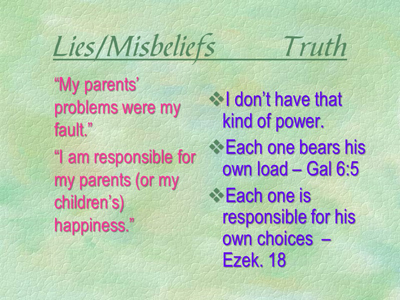Recently I had the privilege of speaking in a women’s prison. I shared my story which I call, “How to Handle the Things You Hate But Can’t Change.” (How’s that for a topic of interest for incarcerated people?)
 But then I was able to speak briefly about what we have in common, a situational loss of freedom. I have lost the ability—the freedom—to walk, and they have temporarily lost the ability—the freedom—to walk out of lockup. Still, even while imprisoned by our situations, Jesus offers true freedom that has nothing to do with our circumstances. He promised to His disciples, “You will know the truth, and the truth will set you free.” He even said, “If the Son sets you free, you will be free indeed.” (John 8:32, 36)
But then I was able to speak briefly about what we have in common, a situational loss of freedom. I have lost the ability—the freedom—to walk, and they have temporarily lost the ability—the freedom—to walk out of lockup. Still, even while imprisoned by our situations, Jesus offers true freedom that has nothing to do with our circumstances. He promised to His disciples, “You will know the truth, and the truth will set you free.” He even said, “If the Son sets you free, you will be free indeed.” (John 8:32, 36)
So what does THAT mean?
What was so crazy great about this opportunity to speak to and hug and love on the precious ladies in the women’s prison, was that the previous weekend I had given four messages on freedom at a women’s retreat at sea. (You can listen to the recordings here, if you like.) So many facets of freedom were already rolling around in my head as I thought about Jesus’ offer of freedom to women in prison.
• As we look at our past, Jesus can set us free from guilt when we confess our sins and receive His forgiveness and cleansing (1 John 1:9). He can set us free from shame, that feeling of not just making a mistake, but being a mistake, when we receive His gift of honor as He showers pleasure and acceptance on us.
 • As we look at our present, Jesus can set us free from the “tapes” of lies and misbeliefs that control our lives, as we replace the lies with His truths. For example, a number of the ladies at the retreat had lived in bondage to the lie that they had to be perfect in order to be acceptable. The weight of needing to be perfect is soul-killing because it’s impossible for imperfect people to be perfect! But we can be set free by embracing the truth that only God is perfect, so we can let go of the unrealistic expectation that we can ever live perfectly this side of heaven. God knows we will stumble, and He has promised to hold our hand when we do. And beyond that, He understands our longing for perfection is actually a longing for the perfect home of Eden, which we will get to experience on the New Earth we read about in the book of Revelation.
• As we look at our present, Jesus can set us free from the “tapes” of lies and misbeliefs that control our lives, as we replace the lies with His truths. For example, a number of the ladies at the retreat had lived in bondage to the lie that they had to be perfect in order to be acceptable. The weight of needing to be perfect is soul-killing because it’s impossible for imperfect people to be perfect! But we can be set free by embracing the truth that only God is perfect, so we can let go of the unrealistic expectation that we can ever live perfectly this side of heaven. God knows we will stumble, and He has promised to hold our hand when we do. And beyond that, He understands our longing for perfection is actually a longing for the perfect home of Eden, which we will get to experience on the New Earth we read about in the book of Revelation.
• We can walk in the breathtaking freedom from the soul-crushing imprisonment of unforgiveness by forgiving those who have hurt or offended us. The weight of others’ sins against us is bad enough, but Jesus said that if we refuse to forgive, we will be subject to tormentors—demonic torturers (Matthew 18:34-35). When we release our offenders over to Jesus for Him to deal with, we are set free—free indeed!
• As we think about the future, there is glorious freedom when we trust God instead of being controlled by fear. So often, we are in bondage to fear because we want to be in control. We forget that we are not God, wanting to manage not only our own lives but the lives of others. There is freedom in trusting God instead of trying to control others.
• Proverbs 29:25 assures us that fear of man is a snare. This isn’t talking about being afraid of people like some are afraid of heights, or the dark, or spiders. Fear of man is about working for other people’s approval and fearing their disapproval. When we look to Jesus, though, we see how He modelled living for “an audience of One,” caring only about pleasing His Father (John 8:29). When we follow Christ’s example, living to please the Father instead of fickle people, there is freedom! I can personally attest to this. Because of my stubborn attachment to a biblical sexual ethic, I have been slimed online by people who despise God’s standards. The slime slides off, though, when I keep my focus on the Lord and, like Jesus in Hebrews 12:2, I can “despise the shame” by refusing to accept it. That’s what freedom feels like!
• There is true freedom in accepting God’s choices for our lives: personality and temperament, introversion or extroversion, health limitations, even capacity. (Some people naturally have a “gallon” energy tank, while others naturally have a cup.) Resenting and fighting God’s choices—even gender!—leads to expending mental and emotional energy that is restricting and costly. But embracing God’s right to make these decisions for our design and our lives, laying down our non-existent “right” to define ourselves the way WE want, brings us freedom.
 • One of my dear friends discovered, in the process of working through the challenges of parenting a prodigal adult child, that there is freedom in owning 100% of our own part and 0% of other people’s choices and behaviors. There’s no point in taking on guilt or responsibility for someone else’s choices; they are completely responsible for their part.
• One of my dear friends discovered, in the process of working through the challenges of parenting a prodigal adult child, that there is freedom in owning 100% of our own part and 0% of other people’s choices and behaviors. There’s no point in taking on guilt or responsibility for someone else’s choices; they are completely responsible for their part.
• And finally (though definitely not exhaustively), we are free to choose our attitudes. We can decide to either live in bondage to an attitude of entitlement or a continual expectation of the negative, or live in freedom by developing an attitude of gratitude. I love Dr. Charles Swindoll’s poem on Attitude:
The longer I live, the more I realize the impact of attitude on life.
Attitude, to me, is more important than facts.
It is more important than the past,
than education, than money,
than circumstances, than failure, than successes,
than what other people think or say or do.
It is more important than appearance, giftedness, or skill.
It will make or break a company . . . a church . . . a home.
The remarkable thing is we have a choice
everyday regarding the attitude
we will embrace for that day.
We cannot change our past . . .
we cannot change the fact that people
will act in a certain way.
We cannot change the inevitable.
The only thing we can do is play on the one string we have,
and that is our attitude.
I am convinced that life is 10% what happens to me
and 90% of how I react to it.
And so it is with you . . . we are in charge of our Attitudes.
It’s possible to be “free indeed.” Regardless of your circumstances. Choose the freedom Jesus offers!
This blog post originally appeared at blogs.bible.org/engage/sue_bohlin/free_indeed on July 25, 2017.